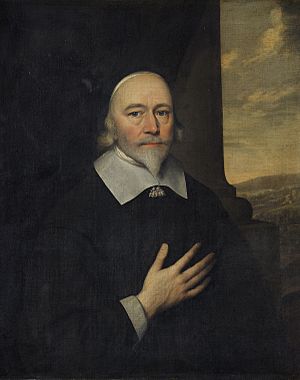Richard Love facts for kids
Richard Love (born 1596, died 1661) was an important English church leader and scholar. He held many big jobs, like being the head of Corpus Christi College in Cambridge. He was also a professor of divinity and a member of a special group called the Westminster Assembly. Later, he became the Dean of Ely Cathedral.
Contents
Richard Love's Early Life and Education
Richard Love was born in Cambridge on December 26, 1596. His father, also named Richard Love, was an apothecary, which is like a pharmacist. His father passed away when Richard was young, in 1605.
Richard likely went to a free school in Cambridge. Later, he studied at Clare Hall, which is part of Cambridge University. He became a fellow there before 1628. A fellow is a senior member of a college.
Important Roles and Challenges
In 1628, Richard Love became a "proctor" at the university. This meant he helped keep order and enforce rules. Around the same time, he became a chaplain for King Charles I. The king even gave him a church job in Eckington, Derbyshire, in 1629. In 1631, he earned his D.D. degree, which is a high degree in theology, with the king's support. He also received another church position at Lichfield Cathedral.
Leading Corpus Christi College
King Charles I chose Richard Love to be the Master of Corpus Christi College in Cambridge. He started this important role on April 4, 1632.
Love faced a challenge soon after. A powerful person, Robert Rich, the Earl of Warwick, tried to force the college to accept someone he wanted as a fellow. But Richard Love and the other fellows stood up to him. They resisted, and eventually, the king told Warwick to back down. Love sent a letter to the king to explain everything.
Vice-Chancellor of Cambridge University
From November 1633 to November 1634, Richard Love was the Vice-Chancellor of Cambridge University. This was a very important leadership role. During this time, he ordered the arrest of a preacher named Peter Hausted. Hausted was giving a sermon in a church and criticizing how people were ignoring their religious duties at the university.
During the English Civil War
The 1640s were a difficult time in England because of the English Civil War. Many people at Cambridge University left their jobs. However, Richard Love was one of only four college heads who stayed in their positions. He was friends with Colonel Valentine Walton, a military leader who supported the Parliament. This friendship helped protect Love during the time when Parliament was in control.
In 1649, Love became the Lady Margaret's Professor of Divinity. This was a very respected teaching position. He also managed to keep his other church jobs. However, in 1650, his jobs were at risk because he refused to sign "the Engagement." This was a promise of loyalty to the new government after the king was defeated. It's not clear if he ever signed it, but he did manage to keep his positions. He was also made a member of the Westminster Assembly, a group of religious leaders, but he didn't seem to take an active part in their meetings.
Later Life and Legacy
After the king returned to power in 1660, Richard Love was made the Dean of Ely Cathedral. He officially started this role on September 28. He passed away in early February 1661 and was buried in his college chapel.
Richard Love's Writings
Richard Love wrote two speeches in Latin to celebrate the return of King Charles II. He published them together in 1660. In the first speech, given at Cambridge, Love cleverly talked about the problems of the recent war. He also carefully explained why he had temporarily gone along with the Parliament's rule. The second speech was given directly to the king at Whitehall. Love also contributed to a collection of poems published at Cambridge to celebrate the king's return.
He also published a sermon he gave in 1642 called The Watchman's Watchword.
Family Life
Around 1632, Richard Love married Grace. Her father, Henry Moutlow, was also a well-known scholar. Richard and Grace had four sons and two daughters. Their eldest son went to Clare Hall, the same college as his father. Their elder daughter, Anne, married a man named Thomas Tenison.
 | Calvin Brent |
 | Walter T. Bailey |
 | Martha Cassell Thompson |
 | Alberta Jeannette Cassell |


